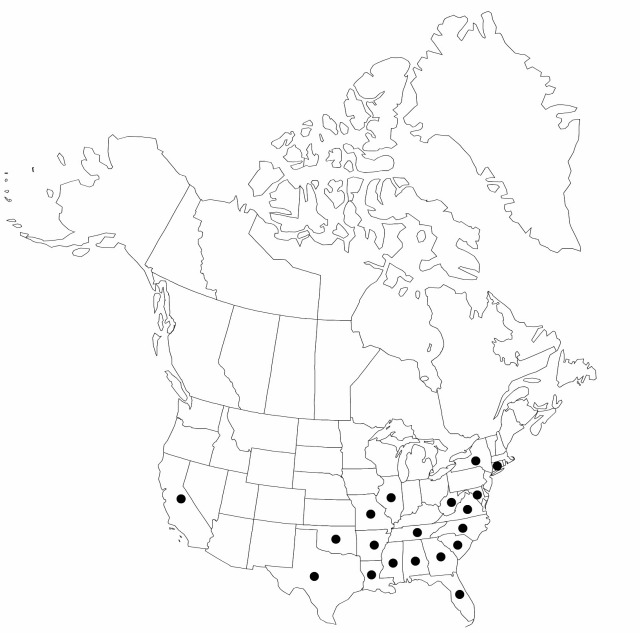Difference between revisions of "Cyperus iria"
Sp. Pl. 1: 45. 1753.
FNA>Volume Importer |
imported>Volume Importer |
||
| (2 intermediate revisions by 2 users not shown) | |||
| Line 6: | Line 6: | ||
|place=1: 45. 1753 | |place=1: 45. 1753 | ||
|year=1753 | |year=1753 | ||
| + | }} | ||
| + | |special_status={{Treatment/ID/Special_status | ||
| + | |code=W2 | ||
| + | |label= | ||
| + | }}{{Treatment/ID/Special_status | ||
| + | |code=W1 | ||
| + | |label= | ||
| + | }}{{Treatment/ID/Special_status | ||
| + | |code=I | ||
| + | |label=Introduced | ||
| + | }}{{Treatment/ID/Special_status | ||
| + | |code=F | ||
| + | |label=Illustrated | ||
}} | }} | ||
|basionyms= | |basionyms= | ||
| Line 23: | Line 36: | ||
|elevation=0–500 m | |elevation=0–500 m | ||
|distribution=Ala.;Ark.;Calif.;Conn.;Fla.;Ga.;Ill.;La.;Md.;Miss.;Mo.;N.Y.;N.C.;Okla.;S.C.;Tenn.;Tex.;Va.;W.Va.;Mexico;Central America;South America;Asia;Africa;Australia. | |distribution=Ala.;Ark.;Calif.;Conn.;Fla.;Ga.;Ill.;La.;Md.;Miss.;Mo.;N.Y.;N.C.;Okla.;S.C.;Tenn.;Tex.;Va.;W.Va.;Mexico;Central America;South America;Asia;Africa;Australia. | ||
| + | |introduced=true | ||
|discussion=<p><i>Cyperus iria</i> was first recorded in the New World from the southeastern United States in the 1840s.</p> | |discussion=<p><i>Cyperus iria</i> was first recorded in the New World from the southeastern United States in the 1840s.</p> | ||
|tables= | |tables= | ||
| Line 46: | Line 60: | ||
|publication title=Sp. Pl. | |publication title=Sp. Pl. | ||
|publication year=1753 | |publication year=1753 | ||
| − | |special status= | + | |special status=W2;W1;Introduced;Illustrated |
| − | |source xml=https:// | + | |source xml=https://bitbucket.org/aafc-mbb/fna-data-curation/src/2e0870ddd59836b60bcf96646a41e87ea5a5943a/coarse_grained_fna_xml/V23/V23_267.xml |
|genus=Cyperus | |genus=Cyperus | ||
|subgenus=Cyperus subg. Cyperus | |subgenus=Cyperus subg. Cyperus | ||
Latest revision as of 20:39, 5 November 2020
Herbs, annual, cespitose. Culms trigonous, (5–)20–60 cm × (0.2–) 0.6–2.4 mm, glabrous. Leaves (1–)3–4, V-shaped, 15–40 cm × 3–6 mm. Inflorescences: spikes 2–5(–8), oblong to ovoid, 2–10 cm × 3–12 mm; rays 4–8, to 11 cm; bracts (4–)5(–7), ascending at 45°, V-shaped, (1.5–)8–30(–50) cm × 1–6 mm; rachilla persistent, wingless (successive floral scales 0.7–0.9 mm apart). Spikelets 10–30, compressed, linear to ellipsoid, 4–20 × 1.5–2.1 mm; floral scales deciduous, (2–)6–26, laterally brown to golden brown, edges clear, medially green, 5-ribbed, outermost ribs more noticeable than others, obovate to nearly orbiculate, 1.3–1.8 × 1.2–1.8 mm, margins emarginate, apex with mucro 0.05–0.12 mm. Flowers: stamens 2(–3); anthers (0.2–)0.3–0.4 mm, connective tips reddish, less than 0.1 mm; styles less than 0.1 mm; stigmas 0.2–0.4 mm. Achenes brown, slightly stipitate, obovoid, 1.2–1.4 × 0.5–0.7 mm, apex apiculate, surfaces puncticulate.
Phenology: Fruiting summer–fall (Jul–Oct).
Habitat: Damp to moderately dry, disturbed soils
Elevation: 0–500 m
Distribution

Introduced; Ala., Ark., Calif., Conn., Fla., Ga., Ill., La., Md., Miss., Mo., N.Y., N.C., Okla., S.C., Tenn., Tex., Va., W.Va., Mexico, Central America, South America, Asia, Africa, Australia.
Discussion
Cyperus iria was first recorded in the New World from the southeastern United States in the 1840s.
Selected References
None.
